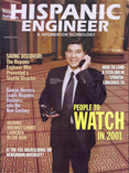Hispanics are growing in both numbers and influence in America, and their impact on the U.S. economy and culture is increasing dramatically. Hispanics make up 11 percent of the U.S. population today and likely will be the largest minority group in the country by the year 2010. During the past decade, Hispanic buying power increased by over 84 percent. By contrast, the growth of Non-Hispanic buying power was 55 percent. Not surprisingly, then, this market of about 31 million consumers is proving increasingly attractive to advertisers.
Hispanics are not only a rapidly growing market, they are a diverse one. The Spanish-speaking community in America includes people from Mexico, Puerto Rico, Cuba, South America, Central America, and Spain. Language and viewing preferences vary among these viewers, and advertisers want to reach them all.
Two powerful television networks in the U.S. are competing aggressively for this important audience. Telemundo, based in Hialeah, just outside of Miami (http://www.telemundo.com), and Univision, in Los Angeles (http://www.univision.com), carry a mix of Spanish-language entertainment, news, and sports programs to viewers across the country.
Telemundo reaches 87 percent of all Hispanic households in the U.S., covering 64 markets. Backed by Sony Pictures and Liberty Media, the network has access to quality television and original programs as well as Sony's Columbia Tri-Star International Television division.
Univision reaches more than 92 percent of all Hispanic households. For the fiscal year 2000, Univision alone boasted sales of $829.9 million and a profit margin of 13.6 percent.
William Press, Telemundo's vice president of operations, oversees seven departments, including engineering and technical production, for the company's three networks. He says the goal of Telemundo is to reach the broadest audience possible with a blend of programming that includes talk, courts, music, sports, and news. Sports coverage is especially fast-paced, with production qualities that would be envied by any network.
Finding and Keeping Quality Talent
"Quality television programming requires qualified engineers who can perform miracles on a daily basis," Press says. Telemundo's goal is to hire Hispanics who can relate to the Hispanic culture, but the company also can use English-speaking engineers.
"We groom engineers if we need to," Press notes. "We hire promising talent from colleges or technical schools and develop them. We train, and they grow. We have senior engineers on our staff who started as cable-runners. We sent them to school, and now they have a level of skill that is unsurpassed."
Telemundo is doing more, however. Last year, it launched a program to offer educational scholarships to Hispanics. And Press sees the program expanding in the future, as the company helps develop "a bigger pool" of talent.
"We face the same problems that other industries face," Press says. "There is a shortage of engineers in general, and when you try to hire Hispanic engineers, that narrows it down even more."
Univision Joins S&P 500
Standard and Poor's announced in February that Univision has been moved to its 500 Stock Index. Univision's stock jumped up about 12 percent on the news. Univision, formerly part of the S&P MidCap 400 Index, replaced Union Carbide, which has been acquired by 500 Stock Index member Dow Chemical.
Univision is the fifth-largest TV network in the U.S. and the country's top Spanish-language broadcaster. A. Jerrold Perenchio, Univision's CEO, called the move "an important milestone for Univision Communications," and industry analysts say that inclusion in the S&P index will reinforce the broadcaster's status and bring it to the attention of the mainstream business world.

